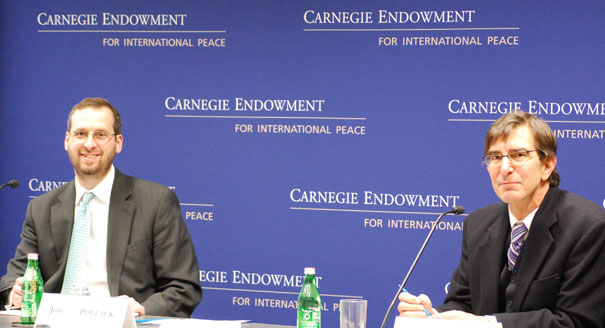Registration
Thank you!
You will receive an email confirming your registration.
It has been known since early 2004 that the illicit proliferation network headed by A.Q. Khan of Pakistan supplied the nuclear programs of Iran, North Korea, and Libya. However, certain questions have not been resolved, including the extent of state involvement in Khan’s activities and the identity of the long-suspected “fourth customer.”
In the January/February 2012 issue of Playboy, Joshua Pollack, a consultant to the US government, suggests that the fourth customer may have been Pakistan's main rival, India. Carnegie hosted Pollack to discuss his article, “The Secret Treachery of A.Q. Khan,” and the possible implications of his findings. Carnegie’s George Perkovich moderated.
The A.Q. Khan Network
- “Father of the Bomb”: Using centrifuge technology acquired from URENCO, a European uranium-enrichment consortium, Khan headed Pakistan’s uranium enrichment program from 1976-2001. In the eyes of most Pakistanis, Khan was one of the nation’s greatest scientists, and he rescued Pakistan from the potential domination of a nuclear-armed India, Pollack explained.
- The A.Q. Khan Network: During his tenure at Khan Research Laboratories, Pakistan’s uranium-enrichment facility at Kahuta, Khan sold gas-centrifuge technology, a type of equipment that could be used to make enriched uranium for nuclear explosives, to numerous international buyers, including Iran, North Korea, and Libya.
- Unresolved Questions: Pollack explained that despite extensive research conducted on the Khan network, several outstanding questions remain regarding Khan’s autonomy, motives, and customers.
Three Versions of the Story
- Khan’s Interrogation: After the discovery of his illicit supply network in 2004, Khan was placed under house arrest and interrogated by the Pakistani Inter-Services Intelligence (ISI) and Strategic Planning Directorate (SPD). During the investigation, Pollack said, Khan provided at least three versions of the story behind his network.
- The Military: In his first version, Khan claimed that Pakistan’s military used him to sell the technology, and that he was being made to take the blame for an Army-controlled process.
- The Dubai Middlemen: In the second version, Khan claimed to have provided blueprints and technical specifications to Dubai-based middlemen, who then used the information for the benefit of Iran and Libya without asking Khan’s consent.
- The Combined Version: In his final version, Khan took exclusive credit for Pakistan’s acquisition of nuclear weapons, but obscured his role in illicit transactions by blaming military officials, the Dubai middlemen, and Pakistani figures who were dead or absent from the country in 2004.
- Khan’s Autonomy: Pollack argued that based on a comparison of Khan’s claims with the findings of the IAEA, Khan was deceiving his interrogators about the extent and timing of nuclear proliferation activities. He appears to have been responsible for and cognizant of the actions of his nuclear proliferation network, and operated freely in an unregulated political and military environment.
Khan’s Motives and Rationalizations
- Campaign of Self-Glorification: Pollack argued that the source of Khan’s activities was an insatiable craving for respect, honor, and admiration. Khan needed a steady stream of revenue in order to fund a campaign of philanthropy and memorialize himself in Pakistani institutions and edifices. Khan paradoxically betrayed his country so that he would be glorified by his country, Pollack said.
- No Harm Done: According to Scott Kemp of Princeton University, Khan sold his customers incomplete collections of components and sets of drawings, in addition to broken or irrelevant components. By consciously selling faulty technology, Khan convinced himself that he was not actually helping Iran or Libya succeed, Pollack explained. Khan also told his interrogators that North Korea, already being advanced in plutonium technology, did not need Pakistani uranium enrichment technology for military purposes.
India, the Fourth Customer?
- A Suspected Fourth Customer: Pollack explained that investigators have long believed that there was a fourth customer for the Khan network. Media accounts frequently cite missing shipments from the Khan network as suggesting the presence of a fourth customer. According to Olli Heinonen, the head of the IAEA Khan investigation, members of the Khan network referred to ‘the fourth customer’ as code language for an unnamed buyer, Pollack said.
- Reasons to Think it was India: Pollack offered several pieces of evidence to suggest that India – Pakistan’s longstanding rival – may have been Khan’s fourth customer:
- Khan’s Lack of Compunctions: Khan found ways to rationalize his transactions, either by undermining his customers or by pointing to their existing nuclear capabilities.
- Special Degree of Secrecy: The enmity between India and Pakistan, and Khan’s desire to preserve his reputation in Pakistan, would help explain the special sensitivity of the fourth customer, whose existence Khan has never acknowledged.
- Overlapping Technologies and Characters: Pollack explained that India was publicly shopping for centrifuge components starting in the mid-1980s, when Khan’s centrifuge supply network became active. The design of centrifuges India acquired in the early 2000s resembles that of a design Khan stole from URENCO, which was later reproduced for Pakistan’s own centrifuge program and sold to Iran, North Korea, and Libya. Furthermore, a South African investigation found that Gerhard Wisser, one of Khan’s major suppliers, also supplied specialized equipment to the Indian centrifuge program.
- Suspicions and Flimsy Excuses: Pollack added that Pakistani President Pervez Musharraf writes in his memoirs that Khan had admitted to a “strong probability” that members of the Khan network supplied India. In his interrogation, Khan both suggested that his overseas network was autonomous enough to supply India without his knowledge, and that India had taken advantage of a connection among the Dubai middlemen. The suspicions of Khan’s interrogators and Khan’s questionable explanations provide additional evidence for India as the strongest candidate for the Khan network’s fourth customer, Pollack argued.
